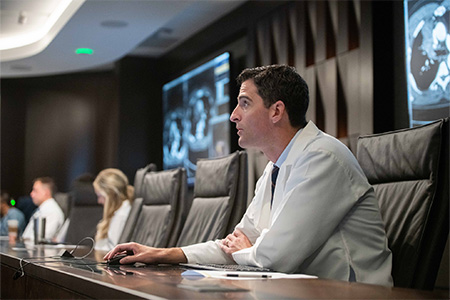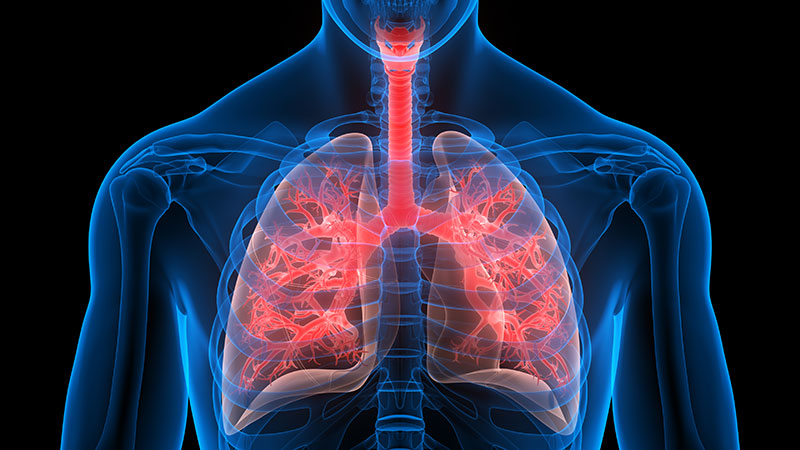Bronchoscopy and Interventional Pulmonology for Lung Cancer
Henry Ford offers advanced techniques to diagnose and treat lung cancer so you can breathe easier.
 We understand how challenging it can be to learn you need testing for lung cancer. Our expert team at Henry Ford Cancer is here for you.
We understand how challenging it can be to learn you need testing for lung cancer. Our expert team at Henry Ford Cancer is here for you.
We use advanced technology to help us learn more about your condition so we can rule in or rule out lung cancer. If you’re at risk for lung cancer, we recommend lung cancer screening to improve your chance of early detection and effective treatment.
Our goal is to give you a fast and thorough diagnosis so we can move forward with your personalized treatment plan.
In addition to the imaging tests and biopsy options listed below, we’re also home to Michigan’s only comprehensive Interventional Pulmonology Program. Interventional pulmonology lets doctors diagnose and treat lung cancer without incisions using procedures performed with a bronchoscope, a thin, flexible tube with a light and a tiny video camera that lets us view the inside of your lungs. We’re also one of the first in the United States to use new robot-assisted bronchoscopy technology, which lets us more accurately diagnose small and hard-to-reach nodules in the lung.
Henry Ford offers advanced techniques to diagnose and treat lung cancer so you can breathe easier.

We use a bone scan after diagnosing lung cancer to make sure the cancer hasn’t spread to your bones.
We inject a radioactive substance called a radiotracer into your vein. As the radiotracer travels to your bones, it gives off radiation that we can detect with a special camera. During the scan, this camera takes images of your body to see how much radiation collects in your bones.
The bone scan lasts about an hour, but you may have to wait up to four hours after receiving the radiotracer injection. This allows your bones to absorb the tracer so we can successfully complete the test.
A computed tomography (CT) scan uses X-ray technology. However, it’s different than a chest X-ray because it can take pictures of cross-section areas of your body.
During a CT scan, you’ll lie on a table that will slide into a tube-shaped machine. The machine will take pictures of your body from every angle. A radiologist will then use the pictures to create 3D images of your body. You’ll need to lie very still to keep the images from being blurry. The scan only lasts for a few minutes.
A magnetic resonance imaging (MRI) scan lets us use magnets and radio waves to create images of your chest. It does not use X-rays.
Some MRI scans use a special dye that lets the radiologist see parts of your body more clearly. Your doctor will inject dye into your body through an intravenous (IV) tube before the scan.
During your MRI scan, you’ll lie down on a table that slides into a tube-shaped scanner. You’ll wear a hospital gown, and you’ll need to take off any metal jewelry or accessories, because they can interfere with the test. Your MRI will last around 30 minutes to an hour.
During this test, we’ll inject a medication called radioactive octreotide into one of your veins. Once there, the radioactive octreotide will travel through your bloodstream and attach itself to any tumor cells that may exist.
Next, we’ll use a device that detects radioactive octreotide to create images of your body. These images can tell us if there are lung cancer cells and, if so, where they’re located.
At the beginning of your positron emission tomography (PET) scan, we’ll give you a radioactive substance called a tracer through an intravenous (IV) tube.
The tracer may take up to an hour to absorb into your body. Once it does, the tracer will collect in your organs and tissues, which will let your radiologist see areas of your body more clearly. You’ll lie on a table that slides into a tube-shaped scanner. The scanner will take 3D pictures that show how your organs and tissues are working.
In most cases, if we diagnose lung cancer from the results of one or more of the above imaging tests, your doctor will order a biopsy to confirm that diagnosis. A biopsy is a procedure in which your doctor takes a tissue sample from the suspected tumor so we can rule in or rule out a cancer diagnosis.
In an open-lung biopsy, your doctor will put you under general anesthesia, make an incision in your chest and remove a sample of your lung tissue for testing. We may leave a tube leading to your lungs in your mouth for a day or two after the procedure to keep your lung from collapsing.
We also offer a minimally invasive version of the open-lung biopsy, which is called a thoracoscopy. In a thoracoscopy, we’ll make a small incision in your chest and insert a thin, flexible tube called a thoracoscope that has a light and a tiny video camera. We’ll then use small instruments that we pass through the thoracoscope to take a sample of lung tissue for testing.
In a robot-assisted bronchoscopy, your doctor will use our robotic technology to pass a bronchoscope into your lungs to take a tissue sample. This procedure lets us accurately diagnose small and hard-to-reach nodules in the lung.
If we find that your biopsy sample is cancerous, we’ll determine how advanced the cancer is and whether you may benefit from certain treatment options, including targeted therapy (treatments that target genes and proteins specific to cancer cells) or immunotherapy (treatments that boost your immune system’s ability to fight cancer).
While most providers analyze whether patients would benefit from medications that have been approved by the Food and Drug Administration (FDA), we’ll also check your sample to see if you may benefit from treatment with any medications that are still in development and being tested in one of our clinical trials.
If we confirm that you have lung cancer, we’ll spend several hours with you to explain your diagnosis, review your treatment plan and answer any questions you have. Please bring a family member, friend or caregiver with you, because you’ll learn a lot of important information.
At your appointment, you will:
The nurse navigator will be your main point of contact throughout treatment. Your nurse navigator will help you schedule appointments, answer your questions and help you find additional support services, including therapies for managing your symptoms.
We use cookies to improve your website experience. By using this site, you agree to our Terms of Use. Read our Internet Privacy Statement to learn what information we collect and how we use it.